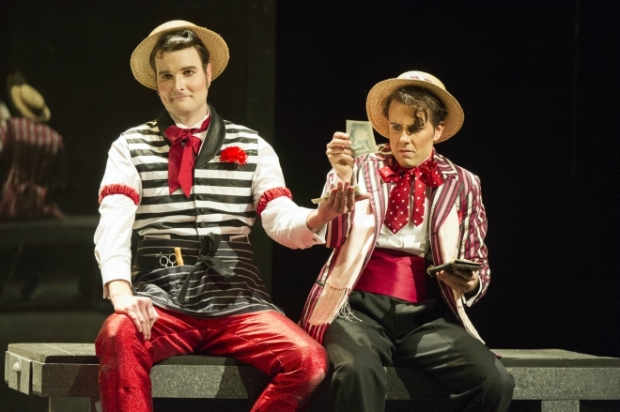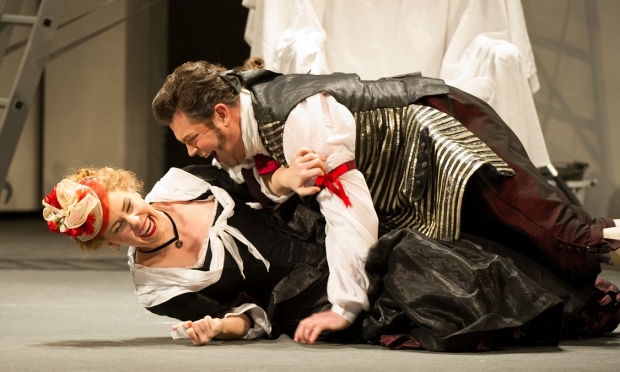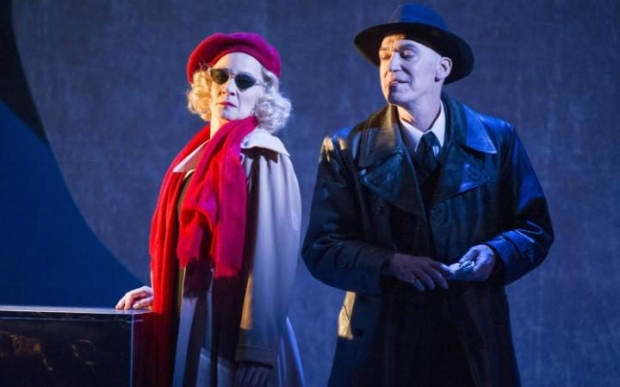Figaro Forever (Wales Millennium Centre and tour)
As well as ”The Barber of Seville” and ”The Marriage of Figaro”, WNO presents a brand new ”Figaro” opera

© Richard Hubert Smith
For reasons of economy and, quite possibly, sentiment, the stage environments by 91-year-old design legend Ralph Koltai are shared by all three of these Figaro operas. A giant pair of hanging panels lumber and turn and give the stage crew nightmares. For the rest, don’t expect much by way of aesthetic cohesion as WNO‘s trio of individualistic directors do their own thing.
Sam Brown‘s new production of The Barber of Seville is free-spirited to the point of indulgence; several gags that probably felt good in the rehearsal room struggle to reach the audience, even though (or, more likely, because) his eager players push them hard. Brown declares his hand early by kitting out Count Almaviva as a one-man band for the wooing scene, but not before he’s interpolated into the overture a giant scissor masque whose timing (it’s choreographed to Rossini’s precise rhythms) is fractionally the wrong side of perfect.
James Southall conducts his second barber-based show for WNO after Sweeney Todd; tempos are lithe and idiomatic but he’s more attentive to notes on the page than the needs of his singers. The Count is sung in pleasant if stringy tones by Nico Darmanin; Rosina by the more forthright Claire Booth. Booth’s a soprano rather than the usual mezzo, but more importantly Rosina is a young girl who’s destined to become a Countess in operas to come. So why dress her in froufrou and French knickers? Booth is a cracking singer without such accretions, as she shows in a splendid account of the singing lesson that comes complete with a sly nod to the peg-legged heroism of Joyce DiDonato.
That was at Covent Garden in a production where Figaro famously makes his entrance through the audience, a coup that Brown borrows. Nicholas Lester is the bay rum cove here, sleek in Rylan-satin slacks, smooth of voice and chin but not quite on top of the patter. For that we need Andrew Shore – and we get him. The buffo king wears Dr Bartolo’s hubris like a favourite toupée, and he even copes with Kelley Rourke’s lacklustre translation. [***]

© Richard Hubert Smith
It’s all change for The Marriage of Figaro , also in English but this time using Jeremy Sams’s irresistible version. Bass Richard Wiegold is the only common factor between the two evenings; in Rossini he steals the show as a blind Basilio (or, rather, his puppet dog does) while for Mozart he takes over as Dr Bartolo where he’s dominated in more ways than one by Susan Bickley‘s Marcellina, a wild, whacky and wonderfully sung creation.
Director Tobias Richter treats himself to a pointless modern-day prelude that’s soon forgotten as Welsh National Opera’s departing music director Lothar Koenigs helms his final opera for the company. From the astringent overture to a simply rapturous finale, balance, ensemble and attack are ideal, the conductor guiding his singers through Mozart’s intricacies with the joy that comes from having saved the greatest opera till last.
It doesn’t hurt that soon-to-be-weds Figaro and Susanna are sung and acted with wit, grace and musical beauty by David Stout and Anna Devin. I have rarely enjoyed these characters more: they sing as one, yet a hundred connecting currents bring their union to life. In a forward nod to the third opera on the slate, Elizabeth Watts portrays the cuckolded Countess as a near-tragic figure locked in a psychological nightmare. A lyrical and brooding Mark Stone is the miserable Count and Naomi O’Connell a hormonally hyper Cherubino, and on the night I attended Michael Clifton-Thompson did a fine job standing in for Alan Oke as Don Basilio. [****]

© Richard Hubert Smith
The great Oke dominates new opera Figaro Gets a Divorce as a brooding presence of undefined evil. WNO’s artistic director David Pountney, who also directs, has crafted a grim libretto from the bare bones in Horváth’s pessimistic 1936 play of the same name, seasoned with ideas from Beaumarchais’ own third Figaro play, La Mère coupable. His themes are dysfunctional relationships, political exile and the plight of refugees, so don’t go expecting a rollicking night out. It’s refreshingly disconcerting to watch so many of the Mozart cast wrestle with such downbeat material and they do so with great flair.
Time has passed, and with it an innocent world. Everyone’s gone rancid as the Almavivas flee the revolution, but an insidious neo-Rasputin figure known as the Major (Oke) has the ear of Mark Stone’s increasingly wretched and cash-strapped Count so prospects of escape are poor. Figaro (David Stout again) is back in the salon and a sacked Susanna seeks comfort in the arms of a sleazy barkeeper (countertenor Andrew Watts) whom we come to recognise as Cherubino. Meanwhile a loved-up young couple, Serafin and Angelika (Naomi O’Connell and Rhian Lois) may or may not be blood related…
Justin Brown conducts, crisply and with conviction, a score of sustained technical aplomb by Elena Langer. It’s always involving, often haunting with an accordeon adding its tang to the Mozart-sized orchestra, but I miss the sense of an individual voice at work. Too often the Russian-born composer resorts to pastiche, both consciously – in a Kander & Ebb tribute routine and some incidental doo-wap doodles – and perhaps sub-consciously in her writing for Oke (whose vocal lines sound uncannily like Aschenbach) and the Susanna of Marie Arnet (whose music seems to reprise her unforgettable Lulu). Shades of Aaron Copland crop up too; but all told I felt – no slight intended – that Langer might have been more comfortable writing this as a musical. [***]
The Figaro Forever season continues at the Wales Millennium Centre until 27 February, then tours to Birmingham, Llandudno, Bristol, Southampton, Milton Keynes and Plymouth until 9 April.












